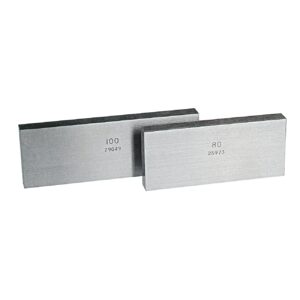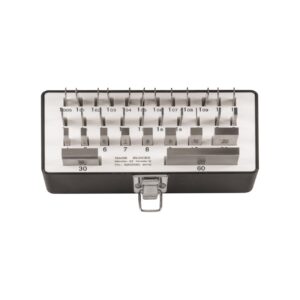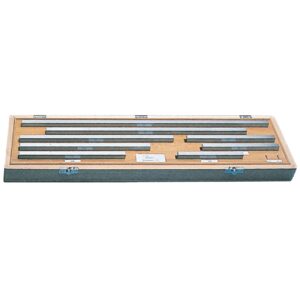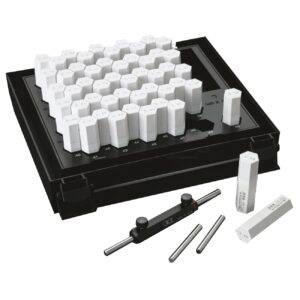In the beating heart of machine shops, where precision and reliability are essential, gauge blocks emerge as indispensable tools. These often underestimated components play a crucial role in ensuring that machining operations are carried out with the utmost accuracy. But what exactly are gauge blocks and why are they so vital to the industry?
Understanding gauging blocks
Calibration blocks, also known as gauge blocks, are precision measuring instruments used to check and calibrate measuring tools and machine tools. Mainly made of hardened steel, ceramic or tungsten carbide, these blocks are designed to maintain an extremely tight tolerance, often in the order of a few microns. Their surface is precisely machined to ensure flawless flatness and parallelism.
The importance of gauge blocks in machine shops
In machine shops, precision is everything. An error of a few microns can compromise the entire production process, leading to costly rejects and production delays. Measuring blocks are essential to ensure that measuring instruments, such as gauges and micrometers, are accurate and reliable. Using these pads, operators can calibrate their instruments, ensuring that measurements are always accurate.
How to use gauge blocks
The use of gauge blocks requires some skill and attention to detail. First of all, it is essential to ensure that the pads are clean and free of contaminants that could affect the measurement. Once clean, the blocks are used to calibrate measuring instruments by placing them between the measuring surfaces and adjusting the instrument until a correct reading is obtained. This process, known as 'block calibration', is essential for maintaining the accuracy of measuring instruments.
Advantages of using gauge blocks
The use of gauge blocks offers numerous advantages. Firstly, they guarantee unrivalled accuracy, which is essential for applications where the tolerance is minimal. Furthermore, their durability and resistance to wear make them a long-term investment for any machine shop. Finally, their versatility allows them to be used in a wide range of applications, from calibrating measuring instruments to checking surface flatness.
Frequently asked questions about gauge blocks
1. What materials are used for gauge blocks?
Striker blocks are generally made of hardened steel, ceramic or tungsten carbide. Each material offers specific advantages in terms of wear resistance and dimensional stability.
2. How do you store the striker blocks?
It is important to store the striker blocks in a clean, dry environment, preferably in a protective case, to avoid damage and contamination.
3. How often should the gauge blocks be calibrated?
The frequency of calibration depends on usage and the environment in which they are used. However, periodic calibration is recommended to ensure maximum accuracy.
4. Can they be used for direct measurements?
Although gauge blocks are mainly used for calibration, they can also be used for direct measurements in specific applications.
5. What is the difference between steel and ceramic gauge blocks?
Steel gauging blocks are more common and offer a good balance between cost and performance. Ceramic blocks, on the other hand, offer greater corrosion resistance and superior dimensional stability, but at a higher cost.
Conclusion
Striker blocks are essential tools for any self-respecting machine shop. Their ability to guarantee measurement accuracy and reliability makes them indispensable to successful machining operations. Investing in high quality gauge blocks and keeping them correctly calibrated is crucial to ensuring that manufacturing operations are always up to the highest standards. In a world where precision is everything, gauge blocks are a fundamental pillar of the machining industry.
Showing 1–24 of 26 results























